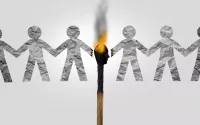Los Angeles Times July 31, 2003
The Bush administration's naive belief in free-market economics reached a new level of absurdity this week with the proposal to create a futures market in terrorism. The argument behind the proposal was simple: Information is valuable, and information about a possible terrorist attack is particularly valuable.
One of the often-lauded virtues of futures markets is their ability to bring together disparate economic information and add it up together (or "aggregate it," as economists say).
In a futures market, participants agree to trade, at a pre- negotiated price, commodities that have not yet been produced. Buyers hope that on the day of delivery the price they've paid will turn out to be low — lower than the prices then prevailing on the market -- while sellers hope just the opposite.
Studies have shown that in some instances prices negotiated today on a futures market can serve as a reasonably good predictor of what the price will be on the day of delivery. Consider the futures market for wheat in September. If today's price in that market is $3.39 per bushel, then $3.39 is a good prediction of what the price for wheat will be. Economists refer to this as the "price discovery" function and believe such markets may not only predict the price of corn or wheat but also election outcomes.
Almost 30 years ago, Sanford Grossman and I investigated theoretically the validity of these claims. We focused on competitive markets in which we assumed participants had some relevant information. For instance, a farmer knows something about his own crop, so if he participates in a futures market he will bring his knowledge to bear on that market. Voters who participate in a futures market also bring relevant information — whom they and their friends are voting for — and that is why futures markets may predict presidential elections reasonably well.
But there are severe limitations in the ability of markets to provide accurate predictions; for instance, where markets have few participants and can be easily manipulated, or where there are large asymmetries of information, with some participants (the few large international chocolate producers, for example, in the cocoa futures market) having far more information than others.
Futures markets provide insurance as well as information: They enable a farmer/trader to reduce the risks he faces resulting from the fluctuations in commodity prices. But by providing "insurance" for participants, futures markets can also create the long-noted "moral hazard" problem — the notion that insurance can alter incentives. Someone who has insured his house for 110% of its value has an incentive to set it afire.
What, then, are we to make of the short-lived proposal by the Pentagon's Defense Advanced Research Projects Agency for a terrorism futures market? Did it reflect a brilliant breakthrough, an extension of market processes into an area where markets, by themselves, feared to tread? Or did it represent market fundamentalism descending to a new level of absurdity?
Under the proposal, which the administration disowned almost as soon as it became public, participants would have been betting, in effect — and perhaps profiting — on such potential events as an attack by North Korea or an assassination of Yasser Arafat.
Of course, no one expected DARPA's John M. Poindexter — notorious for his eventually overturned conviction for lying to Congress about Irangate — to approach the problem from the perspective of economic theory. But what was he thinking? Did he believe there is widespread information about terrorist activity not currently being either captured or appropriately analyzed by the "experts" in the FBI and the CIA? Did he believe that the 1,000 people "selected" for the new futures program would have this information? If so, shouldn't these people be investigated rather than rewarded?
But there are more fundamental problems with the idea. If trading is anonymous, then it could be subject to manipulation, particularly if the market has few participants — providing a false sense of security or an equally dangerous false sense of alarm. If trading is not anonymous, then anyone with information about terrorism would be, understandably, reluctant to trade on it. In that case, the market would not serve its purpose.
Now consider the second function of futures markets — insurance. The Pentagon's proposal would have allowed those with the sophistication and money to "hedge" against the threat of terrorism, financially at least, leaving the rest of Americans fully exposed! Though we have come to expect such inequities from the Bush administration's tax policies, surely the U.S. government should be concerned with the exposure of all Americans to terrorism.
Notice that in proposing this idea, at least the Bushies are recognizing the limitations of the innovative capacity of markets. If this is such a good idea, why haven't the markets created it on their own?
Interestingly, the group promoting the idea, DARPA, had — before Bush took over — a credible record of promoting some important innovations, including an important role in the early days of the Internet.
In its own peculiar way, the administration has once again recognized the limitations of markets — as it did with the airline bailouts, steel tariffs and agriculture subsidies. But once again, the lack of intellectual foundation or a firm grasp of economic principles — or the pursuit of other agendas — has led to a proposal that almost seems a mockery of itself.
Joseph E. Stiglitz, an economics professor at Columbia University, was chairman of the Council of Economic Advisors under President Clinton. He was awarded the Nobel Prize in economics in 2001.






